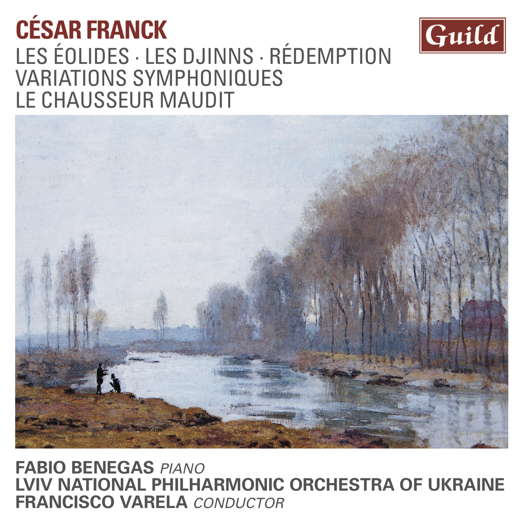 SPONSORED: CD Spotlight. Masterfully Controlled - James Brawn's Beethoven Odyssey impresses Andrew Schartmann.
SPONSORED: CD Spotlight. Masterfully Controlled - James Brawn's Beethoven Odyssey impresses Andrew Schartmann.
All sponsored features >>

An Additional Significance and Poignancy
GERALD FENECH listens to César Franck orchestral music, recorded in Ukraine
'Francisco Varela draws the very best from the Lviv National Philharmonic Orchestra of Ukraine, and performances are consistently fresh, alive and often compelling.'
It took a Belgian composer, César Franck, born on 10 December 1822 in Liège, to convince France of the value of German musical ideas. Before Franck arrived in Paris, French Romantic music had been primarily a tradition of dazzling orchestral colour and seductive harmonies. Franck was interested in the structural and expressive innovations of Beethoven, Liszt and Wagner, and his music combines the best of the two approaches. Indeed, the Gallic lyricism and harmonic colour, shaped through German structural ideas that eventually translate into powerful dramatic forms, are what Franck's music is all about.
Franck began his career as a keyboard prodigy. His father was extremely ambitious to see César's name among the foremost composers of his day. So in 1830 he enrolled his gifted son at the Liège Conservatory. Seven years later and aged fifteen, Franck found himself at the Paris Conservatoire, where he received a thorough training. His wide-ranging abilities were such that he won first prize in virtually every contest he entered, whatever the musical activity. Unfortunately, his father was only interested in his son's potential as a performer, and for a while, he got what he wanted.
As Franck's career developed, his performances were getting warm acclaim wherever he played, and when the time was ripe, he came across Franz Liszt during an 1843 tour of Belgium. The family later moved to Paris, and the composer continued on his tours with great zeal.
In July 1846 the inevitable happened. Tired of his father's paternal tyranny, César rebelled and left the family home. For the next twenty-five years, the composer wrote relatively few works, despite being appointed organist at the Saint Clotilde Basilica in Paris in 1858. It was here that he composed a handful of sacred works and a Mass in three voices. In 1862 Franck composed a set of 'Six Pieces' for organ that Liszt hailed as worthy of a place beside the masterpieces of Bach. Sadly, his duties as an organist delayed any major composing activity for another decade, and his only works of this period were two short cantatas, some organ miniatures and the Schumannesque piano piece Les plaints d'une poupée (A Doll's Heart).
His big break came in 1871, when he was granted membership of the Société nationale de musique, which acknowledged his leading status as a composer. Miraculously, his creative imagination went into overdrive. The works he produced in the following years fused the chromatic sensuality of Wagner's Tristan with the cyclical structural ideas pioneered by Liszt. There were songs, large-scale sacred works, symphonic poems, of which three are on this recording, piano pieces, a Symphony in D minor, a Violin Sonata, and the celebrated Symphonic Variations for Piano and Orchestra.
Just when Franck's creative genius was at its zenith, tragedy struck. In 1890 he was hit by a horse-drawn omnibus and never fully recovered. Matters came to a head when he fell ill with a bout of pleurisy. He died on 8 November 1890, a month short of his sixty-eighth year. His legacy to French music is complex and varied. Parisian organists took inspiration from his phenomenal improvisation skills, and he also pioneered extended compositions for the organ which would lead to even grander works by Widor and Vierne. His advocacy of Liszt's cyclic forms would later influence Debussy and Ravel.
For audiences worldwide, Franck is best remembered for his exhilarating orchestral works, and this release is a truly fitting tribute, marking the two-hundredth anniversary of the composer's birth with, maybe, his three most magnificent tone poems, the famous Symphonic Variations, and an evocative prelude from his oratorio Rédemption.
Composed in 1882, Le Chausseur maudit (The Accursed Hunter) is the most popular tone-poem of the four he wrote. Based upon the ballad The Wild Hunter by German poet Gottfried Burger, the story focuses on an arrogant German nobleman who decides to go hunting on the Sabbath. He rides roughshod over a group of peasants going to church, but meets his punishment in the forest, where a terrifying voice condemns him to an eternity of pursuit by demons. They relentlessly chase him and his horse day and night, and in every place that he goes. He flees, but can never escape the curse that has befallen him. He is indeed the 'Accursed Hunter'. Franck skilfully narrates the story in music of great descriptive power spread over four sections: The Peaceful Sunday Morning, The Hunt,. The Curse and The Demons' Chase. This is hugely exciting stuff, thrilling, melodic and emotionally gripping throughout, especially in the 'Chase', which is absolutely breathless.
Listen — Franck: Le Chausseur maudit
(GMCD7830 track 5, 15:00-16:05) ℗ 2022 Guild Music :
The symphonic poem Les Éolides was the first such piece that Franck wrote. It was composed in 1876, and used as its subject Leconte de Lisle's poem of that name. Premiered on 13 May 1877 at a concert of the Paris Société Nationale, the work was a failure, and at the end of the performance it received only hissing and booing. Seventeen years later, in 1894, four years after the composer's demise, it was given a second hearing, and this time the piece was received with great enthusiasm. Les Éolides is in a single movement, Allegretto vivo, and the music tells the story, or rather, the activities of the 'Éolides', the daughters of Aeolus, the keeper of the winds. It is purely free and unconventional, the composer letting his imagination roam wherever it takes him after the opening motive, which gives expression to the first lines of the poem: 'Oh, floating breezes of the sky, sweet breaths of the first spring that caress the hills and plains with freshest kisses'. The sentiment of the poem is admirably reproduced in this graceful and picturesque music, full of mellifluous orchestration and light-hearted tone painting.
Listen — Franck: Les Éolides
(GMCD7830 track 1, 0:00-1:00) ℗ 2022 Guild Music :
Les Djinns was composed in the summer of 1884, after a request from pianist Caroline Montigny-Remaury, who was a great admirer of the composer. Ironically, she never played the work. This honour fell on Louis Diemer, who premiered this symphonic poem for piano and orchestra on 15 March 1885. The piece is inspired by the eponymous poem in Les Orientales by Victor Hugo, who was one of Franck's main inspirations. Les Djinns or phantoms are mentioned in the Koran, and one may compare them with the evil spirits that tempt man in Catholic belief. Franck takes up the idea of the mysterious and supernatural forces tearing through the nocturnal sky through their passage, and especially the singular rhythm of Hugo's poem, rising from calm into a violent storm, before falling back into the silence of the night. The Koran mentions that the Djinns are made of a smokeless, scorching fire and can be good, evil or neutral. In Hugo's poem, they are of a nasty kind. Franck succeeded brilliantly in depicting in musical terms the atmosphere and feeling of the poem, and not the essence of the poem itself. Les Djinns opens lugubriously, when all of a sudden, the piano enters with force to chase the phantoms away. After much excitement and anticipation, the coda arrives, wherein the apparitions are banished by the spiritual strengths of a softened heart full of love and goodness.
Listen — Franck: Les Djinns
(GMCD7830 track 2, 13:42-14:39) ℗ 2022 Guild Music :
Rédemption was composed with passion and speed, and the form is unique, in which a symphonic poem is surrounded by arias and choruses as well as reflective interludes. Premiered on Maundy Thursday 1873, it narrates the transition of Paganism to Christianity which is then corrupted by unbelief and finally redeemed by prayer. The music has an elevated level that is almost transcendental, by turns serene and ecstatic, sustained by the highly individual and chromatic Franckian harmonies. The Prelude encapsulates all of this compositional ingenuity with some truly well-crafted melodies that propel the listener right into the heart of the story.
Listen — Franck: Rédemption
(GMCD7830 track 3, 0:00-0:56) ℗ 2022 Guild Music :
Dedicated to Louis Diemer, whose premiere of Les Djinns had brought Franck one of his rare orchestral successes, the Symphonic Variations was composed in 1885 and premiered on 1 May 1886. Described by the critics as one of Franck's tightest and most finished works, it is a superb blending of piano and orchestra, and a flawless creation as near perfection as a human composer can hope to get in a work of this nature. It is a brilliant example of Franck's use of cyclic unity, with one theme growing into various others as the piano and orchestra share equally in the continuous evolution of ideas. At first, the work failed to make an impression, but after Franck's death, this masterpiece was championed by his students, including Vincent d'Indy, Paul Dukas and Ernest Chausson among others, and very soon it entered the repertoire of all major pianists.
Listen — Franck: Symphonic Variations
(GMCD7830 track 4, 15:26-16:18) ℗ 2022 Guild Music :
Francisco Varela draws the very best from the Lviv National Philharmonic Orchestra of Ukraine, and performances are consistently fresh, alive and often compelling. Soloist Fabio Benegas' contribution is also immense. Indeed, his virtuoso playing has a sweep and grandeur that carry the music towards its intended goal with warmth and dexterity.
Apart from celebrating the two-hundredth anniversary of Franck's birth, this CD has an additional significance and poignancy with the outbreak of war in the orchestra's homeland, only a few months after these sessions were completed. As a result, Guild will be making a donation to the Disasters Emergency Committee's Ukrainian Appeal for every CD sold. Indeed, a double reason why you should get this issue without further delay. Sound and annotations are top-notch.
Copyright © 17 July 2022
Gerald Fenech,
Gzira, Malta

CD INFORMATION - CÉSAR FRANCK: LES ÉOLIDES; LES DJINNS; RÉDEMPTION
CLASSICAL MUSIC ARTICLES ABOUT BELGIUM




